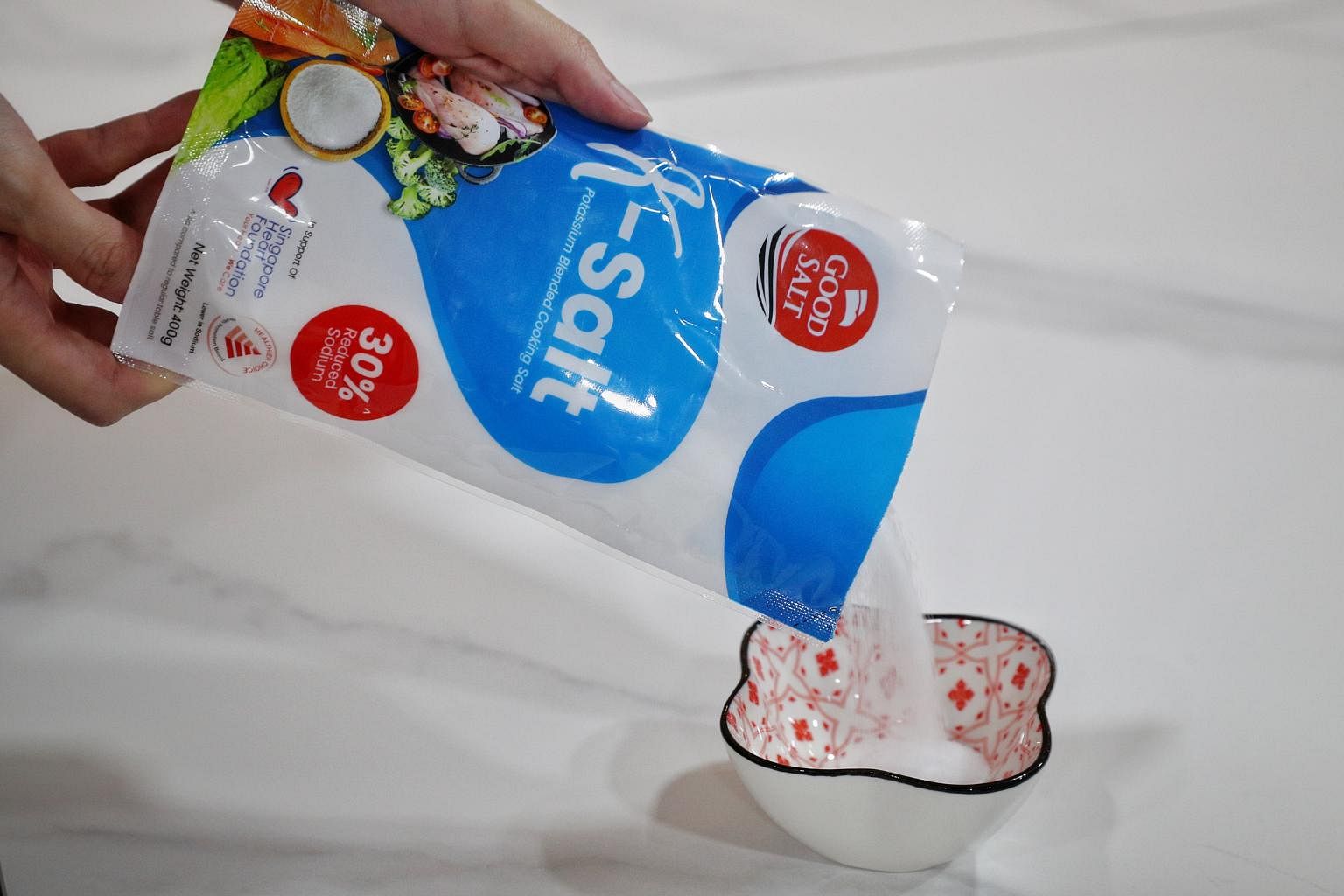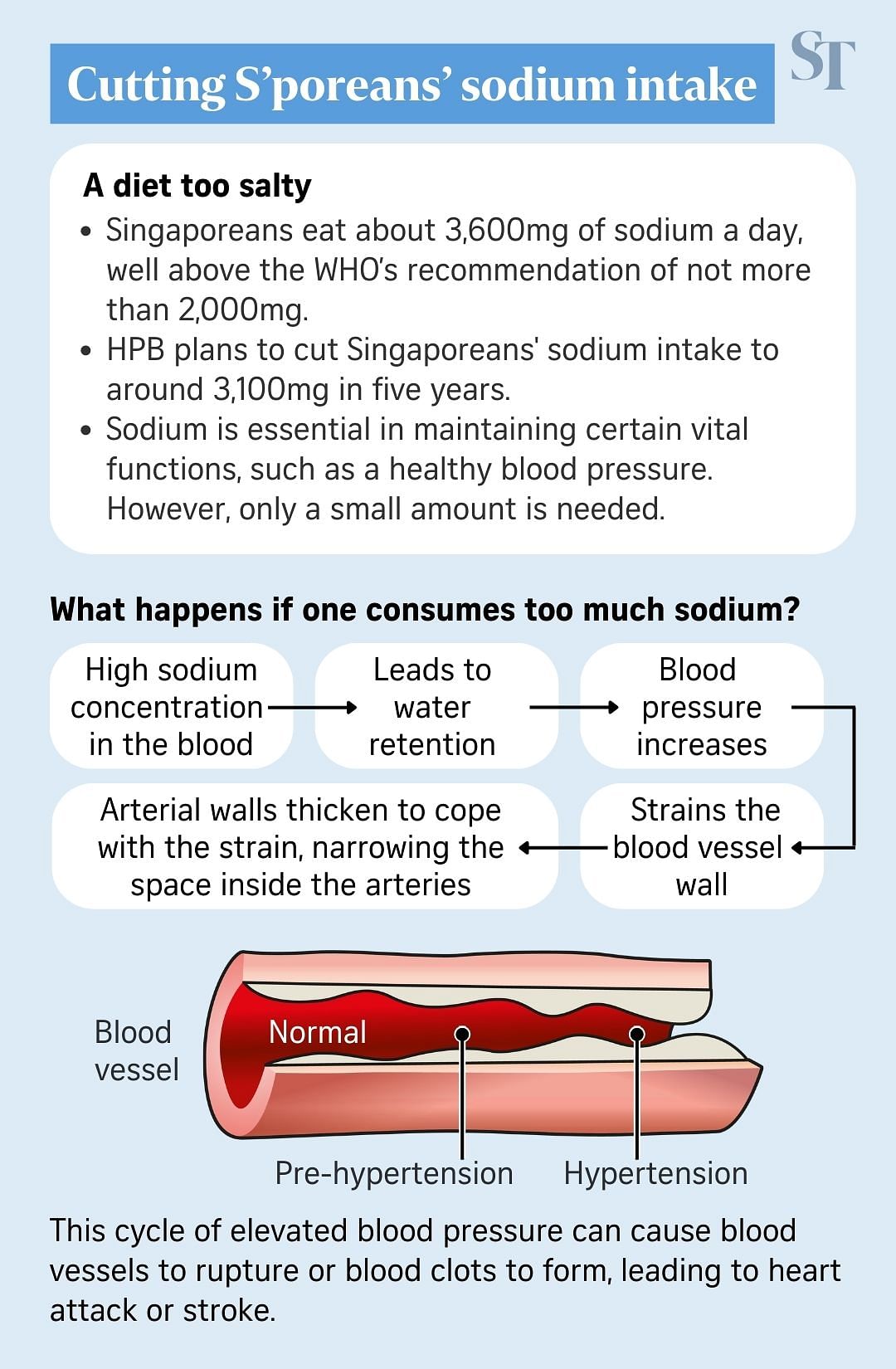S'poreans consuming too much salt: HPB calls for switch to lower-sodium alternatives
Singaporeans are consuming too much salt and plans are in place to get people to cut their sodium intake by about 15 per cent over the next five years.
To do so, the Health Promotion Board (HPB) will urge Singaporeans to replace their regular salt with lower-sodium alternatives, which are considered healthier. It will work with retailers to make these substitutes more affordable.
The board will also ensure there is a greater variety of lower-sodium sauces and seasonings in shops and launch a public education campaign.
These details of the national strategy to cut sodium consumption were outlined by the board on Wednesday. The strategy was first announced during the Budget debate in March.
The diet of Singaporeans has become higher in salt over the years. In 2019, a Singaporean took on average 3,600mg of sodium a day, up from about 3,300mg in 2010. The amount is well above the World Health Organisation's recommended daily salt intake of not more than 2,000mg or about one teaspoon.
A 15 per cent reduction will see the daily sodium intake of Singaporeans fall to around 3,100mg.
Studies have found that excessive sodium consumption results in high blood pressure which can lead to heart attacks and strokes.
Sodium makes up 40 per cent by weight of regular salt, which is sodium chloride. This means that 1,000mg of salt has 400mg of sodium.
Using salt substitutes such as potassium chloride, which tastes like regular salt, can help to reduce one's sodium consumption. This has the added benefit of increasing one's potassium intake, which helps to regulate blood pressure. This is useful as Singaporeans' average potassium intake of about 2,500mg a day is below the recommended 3,500mg to 4,700mg a day, the board said.
However, salt substitutes are about 10 times more expensive than regular salt.
To make these alternatives affordable, the board is working with major retailers to introduce house brand lower-sodium salt by 2023.
For a start, a more affordable lower-sodium salt product will go on sale at supermarket chains FairPrice and Sheng Siong from the first week of October 2022.
Marketed as K-salt, this lower-sodium salt blend comprises mostly sodium and potassium chloride. This blend reduces sodium content by more than 30 per cent when compared with regular salt. It will cost $2.50 for a 400g packet.

The board will also increase the range and variety of lower-sodium sauces and seasonings.
These healthier sauces and seasonings currently make up 25 per cent of all such products on sale in Singapore and the proportion will be increased, said HPB.
In October 2022, it will launch a nationwide sodium-reduction campaign that will stretch on for several years.
A recent local study by the NUS Saw Swee Hock School of Public Health found that an incremental reduction in sodium intake significantly improves health, even for those with normal blood pressure.
Reducing dietary salt intake from 8g to 6g - a reduction of one-third of a teaspoon - lowered blood pressure by 2.1mmHg, regardless of whether an individual suffered from hypertension. A blood pressure of 140/90 mmHg or higher indicates hypertension.
How high salt intake affects health
Sodium plays an essential role in regulating blood pressure, but only a small amount - about 500mg a day - is needed for vital functions. This is equivalent to just a quarter teaspoon of salt.
Excessive sodium consumption results in high sodium concentration in the blood and leads to water retention, raising blood pressure and straining the blood vessel walls.
This causes the arterial walls to thicken to cope with the strain, resulting in the narrowing of space inside the arteries.
It eventually can lead to the rupturing of blood vessels or formation of blood clots, resulting in a heart attack or stroke.
High blood pressure is a major risk factor for cardiovascular disease.
On the other hand, potassium, found in salt substitutes, relaxes the walls of the blood vessels, lowers blood pressure and protects against muscle cramps.
Dr Eunice Pang, the deputy director of policy and strategy development at HPB, said: "Hypertension has risen in Singapore. At the same time, from our National Nutrition Survey, we have seen an increase in sodium intake.
"What we have found is that more than half of the sodium intake comes from salt and 25 per cent from sauces and seasonings. So that is why in our strategy, we are focusing on substituting regular salt with lower-sodium salt first.
"Eating patterns have also shifted and more people are eating out or ordering deliveries. That is why we are also targeting suppliers and working with them to offer affordable lower-sodium salts to food operators so that these operators can then switch to healthier alternatives in their cooking, eventually benefiting consumers."

Get The New Paper on your phone with the free TNP app. Download from the Apple App Store or Google Play Store now


